Episodes
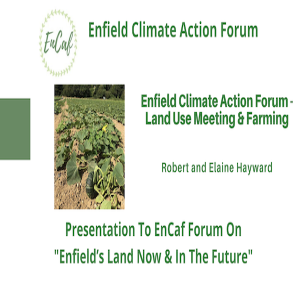
Friday Apr 30, 2021
Enfield Climate Action Forum - Land Use Meeting & Farming
Friday Apr 30, 2021
Friday Apr 30, 2021
Enfield Climate Action Forum (EnCaf) held a meeting last night when it discussed “Enfield’s Land Now & In The Future .“ Do we use it wisely and sustainably? How do we involve the community in exploring what opportunities there are and how do we establish the principles which need to underpin the use of Enfield’s land in the future.
In this presentation to the Forum Robert and Elaine Hayward talk about farming and the difficulties farmers face when they have no clear indication of how the Council plans to use the land in the Green Belt.
This was the first of several presentations
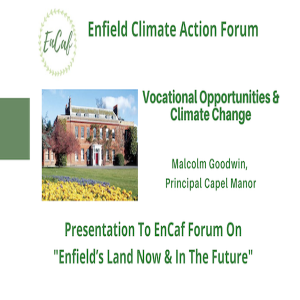
Friday Apr 30, 2021
Friday Apr 30, 2021
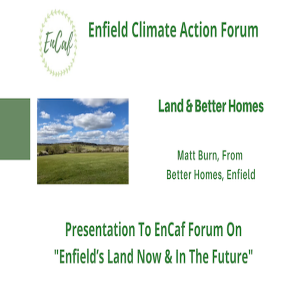
Friday Apr 30, 2021
Enfield Climate Action Forum - Land Use & Better Homes
Friday Apr 30, 2021
Friday Apr 30, 2021
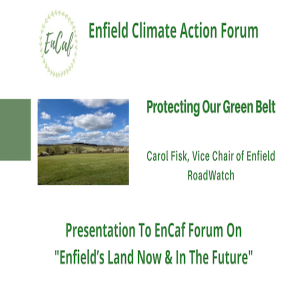
Friday Apr 30, 2021
Enfield Climate Action Forum - Land Use Meeting & the Green Belt
Friday Apr 30, 2021
Friday Apr 30, 2021
Enfield Climate Action Forum (EnCaf) held a meeting last night when it discussed “Enfield’s Land Now & In The Future .“ Do we use it wisely and sustainably? How do we involve the community in exploring what opportunities there are and how do we establish the principles which need to underpin the use of Enfield’s land in the future.
One of the contributors was Carol Fisk from Enfield Roadwatch and she spoke about the Green Belt around a recommendation from the EnCaf Working Group on Land use that read, “To promote the use of land in the green belt for agriculture, agroforestry and market gardening; providing locally sourced, sustainable supplies of timber and fresh, seasonal, affordable food”
This was the first of several presentations
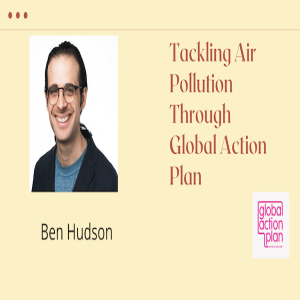
Thursday Apr 29, 2021
Tackling Air Pollution Through Global Action Plan
Thursday Apr 29, 2021
Thursday Apr 29, 2021
In this Podcast we talk to Ben Hudson from Global Action Plan to discuss pollution and how localities can take action to reduce it.
Global Action Plan are the people behind Clean Air Day, the UK's largest air pollution campaign. They bring people together to inspire each other to go further and exert their voice to ensure policy makers and organisations play their part.
To breathe clean air every day we need to make rapid changes: adopting electric vehicles, avoiding millions of car journeys, slashing industrial and construction emissions and stopping buying products that cause pollution in our homes.
To see change at this scale requires us to work as a movement, with changemakers across the country modelling that change, and exerting pressure on government and major polluters.
Air pollution causes heart and lung disease and results in over 36,000 people in the UK dying each year. Clean air is essential for our health, and the co-benefits of clean air measures are also good for our wellbeing as well as being good for the planet.
We will discuss this with Ben Hudson in this webinar and also what action we can take locally and also what action local authorities should also be taking to ensure clean air for everyone.
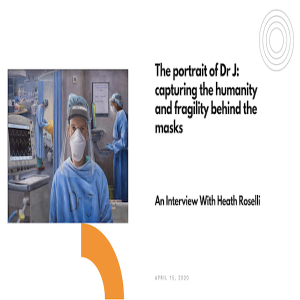
Tuesday Apr 27, 2021
The portrait of Dr J: capturing the humanity and fragility behind the masks
Tuesday Apr 27, 2021
Tuesday Apr 27, 2021
In this Podcast we speak to artist Heath Roselli about her oil painting “Dr J” which was commissioned in May 2020 when a family friend asked her to create a painting depicting frontline staff in the pandemic. Originally Heath wanted to depict what it must be like to be put on a ventilator as a patient and to create a snapshot of dedicated staff in ITU. The painting has succeeded in so vividly capturing the sheer relentlessness of a prolonged pandemic together with the mental toll on NHS staff.
Heath’s diverse and powerful work has attracted national media attention. In particular, her compelling series of portraits painted for healing purposes and stigma removal associated with issues including self-harm, widowhood and cancer, have commanded international acclaim, having been featured in the Times, the Telegraph, the Daily Mail, ITV News and BBC Radio 2. In 1999.
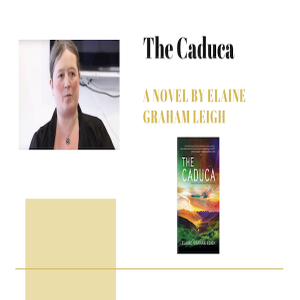
Friday Apr 23, 2021
The Caduca - A Novel By Elaine Graham-Leigh
Friday Apr 23, 2021
Friday Apr 23, 2021
In this Podcast we interview local author Elaine Graham Leigh who tells us about her new book that has just been published. It is a science fiction novel based in the future when planets and galaxies are populated and travel possible.
It is is also a future where humanity has gone to the stars, but taken exploitation and oppression with them, this is a story of imperialism, resistance, friendship and ultimately, liberation
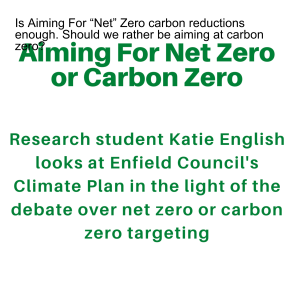
Tuesday Apr 20, 2021
Tuesday Apr 20, 2021
In this Podcast when we discuss the student researcher Katie English whether aiming for net zero to tackle climate change is enough or whether we need to aim for carbon zero,
Many local authorities and government’s Climate Action plant are largely based on trying to achieve carbon net zero at a target date like 2030 or beyond.
There has been considerable criticism of net zero targeting both nationally and globally because aiming for net zero means an organisation can continue to emit greenhouse gases as long it offsets this by developing carbon sinks to soak up emissions. James Hansen the world famous climate scientist has called this monkey business because offsetting is dubious in its effectiveness and avoids the real issue of reducing organisational emissions.
Many organisations are now developing carbon zero targets and not net carbon targets. Richard Murphy the economist working with the eminent group that developed the Green New Deal has argued that it is carbon zero that is vital and not net zero.
So in this Podcast we will will discuss with research student Katie English this issue and the debate raging around net zero targeting and to assess the Government & Council’s plans in the light of this debate. We will be looking at one North London Council as a case study of this.
Katie has recently done a Master’s Dissertation on the resistance to the Edmonton incinerator and its impact on public health and we did a webinar with her on this.
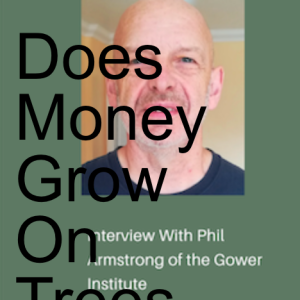
Friday Apr 16, 2021
Does Money Grow On Trees - The New Economics
Friday Apr 16, 2021
Friday Apr 16, 2021
In this Podcast we will be talking to Phil Armstrong from The Gower Institute and ask the question does money grow on trees?
During the economic crisis of 2008/2009 money seemed to appear from nowhere to bail out the Banks from the crisis of debt. It was called quantitive easing. And now during the crisis of Covid billions of pounds have been found to provide back up for those suffering the economic consequences and to fund the National Health Service.
And now many ask if it can be done now then why was it not done before. And others ask - are we not building up a national debt that will have to be repaid someday?
Well these two crises above are producing a new group of economists who argue that there is no such thing as national debt. Currency sovereign countries if they want money can create it by the flick of a computer switch. The only restraint on them is inflation. If inflation begins to rise then they can use fiscal policies to control it.
This new school of economics is called Modern Monetary Theory or MMT and it is a growing discipline that is fast challenging the monetarist theorists that influenced politicians like Regan and Thatcher leading to a period of austerity for many.
We will explore this and see if money does indeed grow on trees.
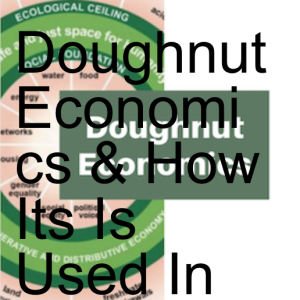
Wednesday Apr 14, 2021
Doughnut Economics & How Its Is Used In Cities & Localities
Wednesday Apr 14, 2021
Wednesday Apr 14, 2021
In this Podcast we talk to Kath MGuire from the Cambridge who with a group of local citizens and academics from Anglia Ruskin University are exploring how the “doughnut economics” described by Kate Raworth (in her book of the same name) can be applied to local authorities and communities.
It maybe a strange term to talk about doughnut economics but many communities and indeed cities across the globe are using Doughnut economics as a framework to bring what they do within the sustainability limits of the planet.
Amsterdam has adopted the Doughnut economic model as Brussels has and other cities are looking at it as well. Together with the Green New Deal it can provide a model for us to use to achieve the world we want and provide well being to all.
Cambridge now have a group working with Anglia Ruskin University to look at how it can be applied to their city and other cities in the UK are looking at it as well.
Doughnut economics was inspired by Kate Raworth in her book and it is has caught the interest of many local authorities as well as nation states.

